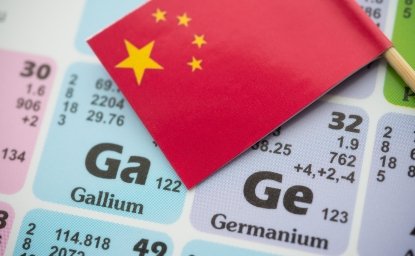THIS IS AN UNEDITED TRANSCRIPT
Hello, I'm John Milewski and this is Wilson Center NOW, a production of the Woodrow Wilson International Center for Scholars.
My guest today is Mark Kennedy. Mark is director of the Wahba Institute for Strategic Competition at the Wilson Center. Previously, he served as a member of Congress from the state of Minnesota and is president emeritus at the University of Colorado. Those are just some of your credits. Mark, I know you have quite the impressive resume. Welcome. Thank you for joining us.
Good to be with you, John. So we're going to be talking today about global ports and maritime U.S. maritime strategy and what prompted this, as you and I ran into each other during the longshoremen's strike, the port strike that lasted all of three days. And this reminded me as as did the crash into the bridge in Baltimore that closed that port for a few days or a few weeks, I should say that we take this for granted until something goes wrong or until a strike happens or something that disrupts the flow.
But this is really important. So I thought, I'm going to ask you a very broad question. I'll apologize in advance. But if you could set some context for us just how important, relatively speaking, is maritime transportation to both economic competitiveness and also to our daily lives? Well, it's vital to your daily lives. 80% of our commercial shipments come to us by water.
You know, there's higher value stuff. You can send out a plane, but 80% of the volumes coming to us. So a lot of the goods that you use every day, they come to you by ship. That's our if this strike had lasted a little bit longer, it both would have helped contribute to rise of rising inflation, but also maybe made it harder for you to try to find something that Christmas things you wanted to buy.
So I think it is vitally important to our competitiveness. It is huge when you think about us having to compete in global markets where, you know, we're we're amongst the highest income nations. So we need to be very efficient that what we do and we've had great productivity in how we produce things. So we're able to be the number two exporter in the world.
But when your ports aren't efficient in shipping things out, the people who particularly suffer are the small businesses or the medium sized businesses. So having efficient ports for exporters as well as making sure that you can get the goods you need is vital to us and we don't spend enough time thinking about it and we are taking it for granted.
On top of everything that you just described. The strike, which lasted three days and I should say, you know, it's not necessarily over. They've extended their agreement till January 15th and are still negotiated on some of the details. But the impact on supply chains, we live in a world now thanks to social media and the Internet, where all kinds of things spread like wildfire.
Empty toilet paper racks in the supermarkets. Because one of the rumors that began to spread is that you needed to stock up on toilet paper as a result of this strike. That's just one take away in the context of which all of this is operating. I'd like to know from the immediate the longshoreman strike, what other takeaways could you share with our viewers?
Well, if it's a first of all, it is just a provisional agreement. A lot of the main important things like the degree to which the ports are going to be allowed to automate to get more competitive and many other thorny issues have not really been resolved at all. So it's it's not at all clear that when we get to January 15th that this will be resolved and we may have a strike resuming.
And then if it goes on longer than a couple of days, you're going to start retailers will start feeling it in terms of their ability to keep the shelves stocked with the things you want as well. As I said, it would contribute to inflation. So it does significantly affect the supply chain. We had an opportunity to be down at one of those ports in Miami a little over a year ago.
And one of the things that they emphasize is, you know, we're all used to getting on whatever website you use. Amazon or otherwise, and ordering it and have something overnight or getting in your phone and ordering. And the more just in time small batch a lot of that, you know they they need to be highly responsive throughout the supply chain.
Ports are a part of that and if they can't efficiently respond to those those just ordered need to get there within the promised number of days orders. You're going to you're going to feel it on this question of automation, Mark. Talk to us about what are the technologies that port operators are looking to employ and what impact those would have on on jobs currently being done by humans.
Let's just first of all, say that our ports are the most expensive in the world to move product on and off. That's not a good thing. I mean, it's probably perhaps not surprising, but it's the reflective of our port operators. The port dock workers are amongst the highest paid already before the 62% increase amongst all of our our workers of of that type in the in the country.
So but if you can't automate and can't be efficient and there are restrictions on that that a full automation needs to come to a labor council to get approved. And there's some debate whether or not they want to take away the ability for semi automation. But when you talk about what can be automated in a new port, I was in Singapore here recently at Singapore Ports and they don't have a person in the port, one of the largest ports in the world.
Nobody. So it's all taken off the ship, transmitted back and forth amongst each other. I mean, clearly there's somebody that's a lot of people working at the Singapore ports, but they the physical ability to offload ships, if it's built that way, it's much harder to retrofit a port that way. And it also adds new weight dimensions that the port may or may not be able to do.
So there's degrees of automation or not automation that you can do in terms of the unloading and the movement of cargo off the ship and around the port. I think the important thing is, is if we're putting up roadblocks to the logical things that could be helpful to make a port operate more efficiently and be more competitive for our importers and exporters.
And that's going to have a hindrance to America. And we ought to be very concerned if there are, as there has been a roadblock for that happening. Another thing that I think people who aren't tuned in to this may find surprising is that the U.S. doesn't control its commercial shipping the way that a lot of other developed nations and our competitors do it, making us highly reliant on others.
Can you talk about that a bit? Where do we sit globally compared to both our competitors and our and our friends? And and what are the downsides? What are the risks involved with being so reliant on everyone from for everything from ship building to shipping lanes to to, you know, the ports themselves, the operation of the ports themselves on a daily basis?
Well, we are a historical anomaly. Never has a world power that depends on imports, exports, engaging around the world and not really had its own sort of control of its shipping. Less than 1% of shipbuilding in the world is done in America. Less than 1% of the ocean going ships, you know, beyond the shores of America are American.
Almost none of the ports are American. In contrast, some of the biggest port operators are Chinese. Three big Chinese state owned companies operate a lot of the ports. In fact, over 100 ports around oceans around the world outside of China. So besides, only the ones in China have ownership interest in over 100 to make sure that they can get their goods moved back and forth.
And they're they're profitable operations for them. And it's a very wise thing for China to do. We own essentially none. And we found that although we have friendly shipping companies, whether it be from the, you know, Denmark or Switzerland that are shippers and that we can contract with in our military if we need extra capacity and we don't have as many large port operating companies that are within the circle of America's closest friends, some but not near as much as we need.
So we we are taking radical risk by not having a greater ownership interest or securing in some way to make sure that there are ports around the world that will be able to move U.S. product A during a time of geopolitical stress. Give us an example of the nature of that risk in the sense, you know, someone could say to us, hey, listen, nobody wants to trade the U.S. economy for any of these other economies.
So somehow we're making it work. So what what is the downside? What is the risk? Could you give me an specific example when you talk about geopolitical uncertainty or instability? What could happen that would have a really negative impact on the U.S. and the way it operates as it relates to ports? Well, one reality was that we wanted to have some shipments go in through Poland to support Ukraine, that there was a Chinese owned dock terminal right next to that that prohibited that shipment from getting completed.
Now, you go to a Taiwan contingency. You have 100 Chinese ports around the world with ownership interest, and you think you're going to get your toilet paper and more importantly, 90% of what the military uses for its equipment and oil and other things is moved by ships. So we need to have assured access to ports and assured non meddling with the products that go through those ports.
The key thing I want to emphasize is the increased transparency, because today's logistics to make it efficient. It's so complicated that a logistics operators need to know what's in each what's in each container on each ship, and even more so, what's in the container that's on the dock about to be shipped from them. So there is a transparency in the shipping process that is vitally important that we consider vitally important for us from securing, you know, what we're going to allow into our ports.
But that also makes you highly vulnerable. If those highly transparent shipments are having to go through ports that may or may not be in hands that want to be facilitating that during a time of geopolitical stress. So, you know, it's those times when you're going to really feel that you really should have spent more time thinking about global ports, not just domestic ports.
So, you know, you're talking about the Chinese having roughly 100 or over 100 ports around the world that they have some stake in. And the U.S. number is it's still zero in that regard. Well, what we're doing, because none of the top ten port operators in the top 15 or 20, maybe port operators or airport operators are American owned.
So we need to look for an ability to just keep it in neutral hands, which is why recently in Sri Lanka, the U.S. Development Finance Corporation extended a F million, half a billion dollar loan to a port there that would be operated by Adani, which is an Indian port operator. We've also done something similar in a couple of other ports around the world, so we've begun to become aware of this, but we really don't have anybody within the government, which is something I focus on.
We state Department does some things, you know, Commerce does on Homeland Security has some responsibility. A development Finance Corp has a mission to do as I just described. But nobody's saying, here's the 100 ports around the world that we need to make sure are in friendly or neutral hands. And here's the plan. We have to help make that happen, whether it be something like the DFC loan that I described or otherwise.
There is a unit within the State Department that looks at that and uses diplomatic efforts to the extent they can be helpful. But I do think we need a higher and more intense level of focus on ensuring in times of geopolitical stress that U.S. still has access to the world's markets. Disruptions we've seen in the Red Sea, the the challenges posed by China and the South China Sea and other waters of the Pacific.
Well, how does that feed into what we're talking about? What are the challenges for the U.S. to maintain this freedom of navigation and freedom of access to ports that you describe it just exacerbates its even more. There are a number of so-called choke points of which the Red Sea is one. And what you're finding is the Houthis have been able to radically reduce the amount of shipment that's going through there.
Who that's hurting most, frankly, is Egypt, which relies on the tolls coming through, you know, the locks there. But it's also hurting Europe. There's a lot of Europe's products are coming through there. It's also hurting the environment because if they can't get through there, they may have to come all the way around. You know, the African point. You know, it's helpful to Cape Town and other ports in in Africa that are getting more business.
But the extra cost is adding to inflation. That extra shipping is adding to emissions to the and affecting the economy. We're also finding in the Panama Canal that given the given what's happening with the climate, that there's less water, less throughput there. There are other choke points around the world we're in in first time in my lifetime where there's more than one blue water navy that's attempting to be global.
And so having two global blue water navies sometimes complicates things. We have now the second largest Navy in terms of number of ships. That's another thing on the maritime domain that should be of concern to people. On the on the infrastructure question, beyond even the global investment within the ports that are on U.S. soil, are we keeping up in terms of maintenance of infrastructure or development of new infrastructure as needed?
Well, I would say generally not. Part of it is automation around the World Bank rates, the efficiencies of how quickly you turn around a container. And on that realm, to our largest ports, Long Beach ranks 373rd in the world and Los Angeles ranks 375th in the world. So that's just the efficiency of which they're operated. And so you heard within the last several years about choke points, about the number of ships, you know, lined up off the coast.
That's because we don't have the efficiencies of throughput. We're not likely to build a lot more ports just because the coast and America are already largely developed. So unless you want to be tearing down neighborhoods and so having efficiency, increasing investments often which are automation or semi automation are vitally important to do that. And those investments typically also make the dockworkers job safer.
They make them more comfortable and and and they make the whole process more efficient. Marco, Just about every question I've been asking you today leads to this question, which is about the need for a comprehensive maritime strategy. Now, I know that you believe this is necessary just because I've been following your work. But if you could talk to us about what that entails, what it might look like, and has the U.S. ever had anything like that?
We have. And and recently. Mayor Ed, the maritime administration has contracted or won to be done, which I will very much look forward to seeing the results of that. I believe they've contracted with the Center for Naval Analysis to do that. Does it include all the elements that I've talked about? I haven't really took a deep dive into it, but I think evaluating the results of that, which I do have a senior fellowship relationship, although I don't work on that project with CNA, I'm confident they're going to do a fabulous job, according to what Merritt has contracted with them to do.
The trick and both of those things is did what Merritt asked them to do cover the whole realm of what we need to be focused on in the maritime space, number one. And then how do you get that actually implemented and not just a plan but a reality? Well, I think the important element that from a strategic competition perspective, we will continue to be focusing on here at the Harbor Institute.
Is there anything that I haven't asked you about? You know, I come to this as the layperson, the interested layperson. You're the expert. And so, you know, I've done my homework, but am I missing anything that we really should talk about? Is there anything else relevant to this issue that you'd like to mention before we sign off? I'd like to say a little bit more about about shipbuilding, because we right now, as I mentioned, we have the biggest by weight.
We have the most carriers and destroyers, but we don't have the biggest Navy. And there's a lot more shipbuilding going on in China, which has 50% market share of ships built in the world where we have less than one. This is an area where we need to collaborate with allies. The big players in this are in Korea and Japan, and the Navy secretary has been reaching out to get them to invest in the U.S. to help, which is beginning to happen, which is good.
But we also have many of the European partners that do more shipbuilding in individual country in Europe than America does. And I think we did in a recent collaboration with Canada and Finland to exchange ideas and technology and and and how you cultivate talent for icebreakers. Given that Finland is the the the world superpower of Icebreaker Icebreaker building.
Those collaborations are good steps. We did a collaboration with UK and Australia on submarines, but this needs to go further because it takes a long while to build shipbuilding and we are on a trajectory to be quite without the capacity in our navy we need. And if you do have one of those contingencies I'm talking about, you're going to need to have the ability to rapidly replenish it.
We don't have that that arsenal democracy available. So I think the whole idea of not just making sure that we've got our array of ports around the world that we know are in friendly or in neutral hands, but that we have both the capacity to keep our Navy as big as it needs to be. And to rapidly replenish what needs to be rapidly replenish in the event that the unfortunate event that we actually have a contingency we need to be prepared for.
Well, as we discussed that at the head of this interview, you know, there are things we take for granted because when they're working, we don't pay attention. But when they stop working, suddenly we're aware. You know, this is one of those issues and I really want to thank you. You're a terrific resource, not just today, but also your ongoing work with the Wahba Institute to focus on those types of things that maybe we take for granted but need to know more about.
So I want to tell our viewers and listeners, if you'd like to know more, come to the Wilson Center, our website. At the top of the page, you'll see a tab for programs. And if you scroll down into that dialog box, you'll find the Wahba Institute for Strategic Competition and all the work of Mark and his colleagues. Thanks for today, Mark.
Good to be with you. Thank you. This is. This has been Wilson Center. Now, we hope you enjoyed this edition and now you'll join us again soon. Until then, for all of us at the center, I'm John Milewski. Thanks for your time and interest.






